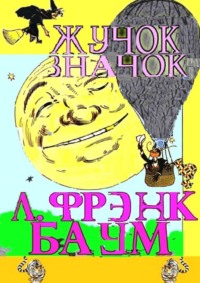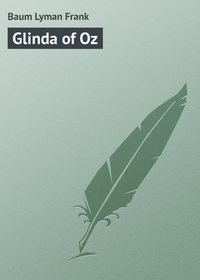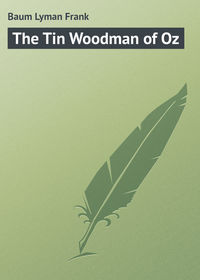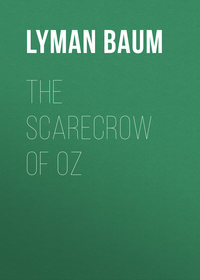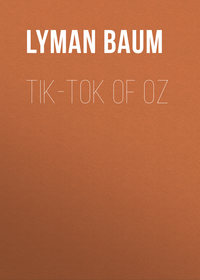 полная версия
полная версияJohn Dough and the Cherub
"Be silent!" yelled the kinglet, annoyed at the clamor.
But the dog's heads paid no attention to the command.
"Very well," said his Majesty; "I'll put a stop to your noise for good and all! Here, you guards, fetch me the Royal Executioner!"
The fat lady began crying anew at this, and presently the door opened and a young girl entered the hall. She was clothed in simple robes of pure white, over which her loose brown hair flowed in a soft cloud. Her eyes were large and dark and very gentle in expression, and her cheeks were fair as a lily. In one hand the maid bore a long sword, the naked blade of which shone brightly in the light. In the other hand was a sharpening-stone, and as she bowed before the kinglet she rubbed the stone gently against the keen edge of the blade.
Although the dog's heads were still quarrelling, and Bebe Celeste still weeping, it was upon John Dough that the Royal Executioner first turned her eyes.
"I hope it isn't this one, your Majesty!" she said, in a voice of disappointment; "for he won't bleed at all, being made of cake."
"I beg your pardon," exclaimed John, hastily. "I am not cake, but gingerbread."
"It's just the same," she answered, sighing; "you wouldn't bleed if I cut you into bits."
"Why are you so bloodthirsty?" asked John, looking reproachfully into the girl's gentle eyes.
"Because I'm the Royal Executioner, I suppose," she answered. "I've held the office ever since my father was destroyed by an earthquake; but I've never yet executed a single person. The kinglet calls me in about a dozen times a day, but something always happens to rob me of my victim. I've worn out three sword blades, sharpening them, but I've never carved anything yet!"
"Be of good cheer," said his Majesty, "for now you shall see blood flow like water. This time I am fully resolved to be terrible. Cut me this snarling cur into two parts!"
"What, the dog?" asked the girl, surprised. And Bebe began to scream loudly; and the fat man woke up and shook his head, and Chick patted both heads of the animal tenderly, and a guardsman cried out: "Oh, no, your Majesty!"
"And why not?" inquired the kinglet.
"Why, this is the most valuable creature in all your dominions!" said the guard. "Do you desire to rob yourself of such a treasure, your Majesty?"
The kinglet hesitated, and then jabbed the fat man with his sceptre.
"Is it so, Nebbie?" he asked.
"It is so, my Lord," answered the fat man. "If you want to butcher anything, cut up a few of the Royal Guards, or mince the Failings, or carve Chick, the Cherub. But the dog Duo is one of the remarkable features of your kingdom, and should be preserved at all hazards. Why, he's worth more than Bebe Celeste."
"That reminds me of Bebe," said the kinglet, looking at the fat one sternly. "Take her away, guards, and stuff her with mashed potatoes and pate de foi gras. If she doesn't regain those two ounces in three days, she'll disgrace my kingdom, and I'll turn her over to the Royal Executioner."
So the guards trundled away the platform on which the fat lady sat, and the dog Duo followed, first one head leading, and then the other. And now his Majesty threw off his ermine robe and laid down the sceptre and scrambled out of the throne.
"The royal audience is ended for to-day," he said, "and now I'll go and see if those cakes and maple-syrup are ready for tea. And see here, you Incubator Baby, look after Sir John Dough, and mind that nobody eats him. If there's one bite gone when I see him again I'll turn you over to the Royal Executioner – and then there won't be any Incubator Baby."
Then his Majesty walked away, chuckling to himself in a very disagreeable manner. At once the fat Nebbie rolled out of his low seat and stood up, yawning and stretching out his arms.
"Our kinglet is a hard master," said he, with a sigh, "and I really wish some one would get up a revolution and dethrone him. He's been punching my ribs all day long, and I'll be black and blue by to-morrow morning."
"He's cruel," said Chick, patting the fat man's hand, as if to comfort him.
"Yet he's too tender-hearted to suit me," complained the lovely Executioner. "If I could only shed a single drop of blood, I'd feel that I am of some use in the world."
"How dreadful!" cried John, with a shudder.
"Oh, not at all!" said the girl. "For what's the object of being an Executioner if one can't execute?" And she tucked the sword under her arm and took out her handkerchief and went away weeping sorrowfully.
The Freaks of Phreex
"Well, didn't I take care of you all right?" laughed the Incubator Baby, leading John Dough from the throne-room and up a broad flight of marble stairs.
"Indeed you did," he answered, gratefully. "Really, my dear Chick, I believe that dreadful kinglet would have eaten me but for you."
"'Course he would," said the Cherub, nodding gayly; "and won't he be wild when he finds there are no pancakes and maple-syrup for tea?"
John stopped short. "Aren't there?" he asked. "Oh, Chick! I'm afraid he'll punish you for deceiving him."
"I don't mind," declared the child. "No one shall eat a friend of mine that I've given my promise to take care of. So come along, John Dough, and don't worry. I've got a lovely room on the top floor of this castle, and I'll share it with you."
So John mounted more marble steps, until finally Chick brought him to a handsome apartment on the third story.
"Here we are!" cried the Baby. "Now, make yourself at home, John, for we needn't fear the kinglet until to-morrow morning, and then he'll have forgotten that I fooled him."
Our hero's first act was to take off the Blunderer's heavy armor and pile it in one corner of the room. When free from the weight of metal he felt more like himself again, and walked to the window to view the scenery.
"It's a pretty place, Chick," he remarked.
"Oh, the Isle is all right," answered the child. "It's the people here that are all wrong, as you'll soon find out. Do you ever eat, John Dough?"
"Never," said John.
"Then, while you're waiting here, I'll go over to the dairy and get my milk for tea. You don't mind if I leave you for a few minutes, do you?"
"Not at all," he declared. "But it has just started to rain, outside; you'll get wet, won't you?"
"That's nothing," laughed Chick. "I won't melt."
"It's different with me," said John, sadly. "If my gingerbread body got soaked it would fall to pieces."
That made the little one laugh again, and it ran merrily from the room and left John Dough alone to stare out of the window. There was a projecting cornice overhead, so he had pushed his head well out to observe the pretty scenery, when suddenly he heard a voice say, in a tone of astonishment:
"Hello, neighbor!"
Turning toward the left, he saw sticking out of the next window to his own a long bald head that slanted up to a peak, underneath which appeared a little withered face that was smiling in a most friendly manner.
John bowed politely.
"Well, well," said the owner of the bald head. "Here's another curiosity come to our island! Wait a minute, and I'll run in and make your acquaintance." So presently the bald head, which was perched upon the body of a little, dried-up looking man, entered John's room and bowed politely.
"I'm Sir Pryse Bocks," he said, "and the remarkable thing about me is that I'm an inventor, and a successful one. You, I perceive, are a delicatessen; a friend in knead; I might say, a Pan-American. Ha, ha!"
"Pleased to make your acquaintance," returned John, bowing. "But do not joke about my person, Sir Pryse. I'm proud of it."
"I respect your pride, sir," said the other. "It's bread in the bone, doubtless. Ha, ha!"
John looked at him reproachfully, and the little man at once grew grave.
"This island is full of inventors," said he; "but they're all cranks, and don't amount to anything – except me."
"What have you invented?" asked John.
"This!" said the other, taking a little tube from his pocket. "You will notice that it often rains – it's raining now, if you'll look outside. And the reason it rains is because the drops of water fall to the earth by the attraction of gravitation."
"I suppose so," said John.
"Now, what do people usually do when it rains?" asked the little man.
"They grumble," said John.
"Yes, and they use umbrellas —umbrellas, mind you, to keep themselves dry!"
"And that is quite sensible," declared John.
The bald-headed one gave a scornful laugh. "It's ridiculous!" he said, angrily. "An umbrella is a big, clumsy thing, that the wind jerks out of your hand, or turns inside out; and it's a nuisance to carry it around; and people always borrow it and never bring it back. An umbrella, sir, is a humbug! A relic of the Dark Ages! I've done away with the use of umbrellas entirely, by means of this invention – this little tube, which can be carried in one's pocket!"
He held up a small instrument that looked like a tin whistle.
"How curious!" said John.
"Isn't it? You see, within this tube is stored a Power of Repulsion that overcomes the Attraction of Gravitation, and sends the rain-drops flying upward again. You stick the tube in your hat-band and walk out boldly into the rain. Immediately all the rain-drops shoot up into the air, and before they can fall again you have passed on! It's always dry where the wearer of this tube goes, for it protects him perfectly. And when it stops raining, you put it in your pocket again and it's all ready for another time. Isn't it great, sir? Isn't it wonderful? Isn't the inventor of this tube the greatest man in the world?"
"I'd like to try it," said John, "for no one needs protection from the rain more than I do. Being made of gingerbread, it would ruin me to get wet."
"True," agreed the other. "I'll lend you the tube, with pleasure. Stick it in your hat-band."
"I have no hat," said John; and then he remembered that he had left both the baker's hat and his candy cane lying on the sands where he had first fallen.
"Well, carry the tube in your hand, then," said the inventor. "It will work just as well that way, but it's not so convenient."
So John took the tube; and having thanked the bald-headed man for his kindness, he left the room and walked down the stairs and through the big, empty hall, and so out into the courtyard.
The rain seemed to have driven every one in doors, for not a person could he see.
Holding the tube upright, he boldly walked into the rain; and it gave him great pleasure to notice that not a drop fell near him. Indeed, by looking upward, he could see the falling drops stop short and then fly toward the clouds; and he began to believe that the bald-headed inventor was really as great a man as he claimed to be.
After descending the slippery path through the rocks, he crossed the patch of green, and at last reached the sandy shore, where he found the baker's hat, soaked through by the rain. As he lifted it he saw the crooked handle of the candy cane sticking out of the sand, and drew it forth to find it in excellent condition, little of the dampness having reached it.
But now, as John Dough began to retrace his steps, he discovered that his feet were soft and swollen. For he had been walking on the damp ground and through the wet grass; and although no rain had fallen upon his body, his feet were getting to be in a dangerous condition, and the licorice in them had become sticky. After he had recrossed the grass and come to the edge of the rocks he began to be frightened, for bits of his left heel now commenced to crumble and drop in the path; and when he tried walking on his flabby toes, they were so soggy and soft that he knew they would not last very long.
While he paused, bewildered, another calamity overtook him. For the tube suddenly lost its power of repulsion and ceased to work, and the rain-drops began to pelt his unprotected body and sink into his flesh. He looked around with a groan of dismay, and discovered a round hole, or tunnel, in the rock nearby. Staggering toward this, he entered the tunnel and found that now no rain could reach him. The floor was smooth and dry, and in the far distance he saw a light twinkling.
Not daring to walk farther upon his mushy feet, John got down on his hands and knees and began crawling toward the farther end of the tunnel. He made slow progress, in that position; but soon he heard a noise of machinery, and felt the warm air of a furnace coming to meet him. That gave him courage to proceed, and he crawled onward until he had reached a large, circular chamber, where a tall man with whiskers that resembled those of a billy-goat was busily working among a number of machines.
"Hello!" this personage exclaimed, as he saw the gingerbread man. "What have we here?"
The voice and eyes were alike kindly; so John told the man his story and asked permission to dry his feet at the glowing furnace.
"Make yourself at home," said the man, and turned to his work again.
The place was lighted by electricity, and was warm and comfortable. John put his feet as near to the furnace as he dared, and soon felt the heat drying up his soaked feet. It was not long, indeed, before his entire body was as crisp and solid as ever; and then our hero stood upon his feet and found that the damage to his heel would not interfere much with his walking.
"What are you doing?" he asked the man.
"Making diamonds," replied the other, calmly. "I suppose I am the only one in the world who ever succeeded in making real diamonds; but people did not believe in me, you see, so they sent me to the Isle of Phreex. Here I have manufactured the finest diamonds the world has ever known, for no one interferes with my work. Look at these."
He threw back the lid of a large tin box, and John saw that it was full to the brim with sparkling gems of a clear white color.
"Take some," said the man, offering him a handful. "They are of no use to me here, because I cannot dispose of them. But I have the satisfaction of making them, just the same. Help yourself!"
"No, thank you," said John. "I have no use for diamonds, any more than you have."
"But the time may come when riches will be a great help to you," said the man, and picking out three very big stones he began pressing them into John Dough's gingerbread body, one after the other.
"There!" he exclaimed. "They are now safely concealed, and if you ever need them you can dig them out and sell them. Those three stones would be worth several thousand dollars if you ever get into the world again, where diamonds are valued."
"You are very generous," said John.
"Oh, not at all, I assure you!" said the man, wagging his goatlike beard with every word he spoke. "In this curious island there is no value to anything whatever, not even to life. All I can do with my diamonds here is to stick them into the kinglet's crown and sceptre; so I'm getting a big stock of them laid by. Very soon I shall begin studding the roof of the throne-room with diamonds, and it will be a pretty sight to see them glittering in one mass."
"Well," said our hero, "if it has stopped raining, I believe I'll bid you good-by."
"Never mind the rain," answered the man. "Here is a winding staircase that leads directly upward into the castle. If you go that way, the rain cannot reach you. The tunnel through which you entered is only used for ventilation."
John thanked the good-natured diamond-maker and started to climb the stairs. There were a good many steps, but after a while he came to a gallery of the castle, and had little difficulty in finding the passage that led to his own room.
As he walked along he heard the sound of a piano, and paused at an open door to peer within the room, for he imagined some one was pounding upon the keys of the piano with a sledge-hammer. But immediately a fluffy-haired man looked up and saw him, and the next instant pounced upon the gingerbread man in much the same way that a cat would pounce upon a rat, and seized him fast, drew him into the room, and closed and locked the door.
John was astonished, but the fluffy-haired musician began pacing up and down the room, swinging his arms and shouting:
"I have it! I have it at last! I am great! I am magnificent! I am better than Vogner himself!" He paused to glare upon John. "Why don't you shout, you baked idiot? Why don't you weep with joy?" he cried. "It is great, I tell you! It is great!"
"What is great?" asked John.
"The symphonie! The divine symphonie, you heartless molasses-cake, or devil's food, or whatever you are! And I composed it —I– Tietjamus Toips! I am greater than Vogner!"
"I didn't hear it," said the gingerbread man.
The musician threw himself upon the piano, and produced a succession of such remarkable sounds that John was surprised.
"Did you understand it?" demanded the fluffy-haired one, jumping up again.
"No," said John.
"No! Of course not! No one can understand it. It is genius! It will be played at all the great concerts. The critics will write columns in praise of it. Some folks can understand Vogner a little. No one can understand me at all! I am wonderful! I am superb!"
"Well," said John, "I'm not a judge. It seemed to me like awful discord."
The musician threw himself upon his knees and burst into tears.
"Thank you, my friend! – my dear friend!" said he, between the sobs. "Such praise gladdens my heart and makes me very happy! Ah! glorious moment, in which I produce music that is not understood and sounds like discord!"
John left the musician still shedding tears of happiness, and walked to his room.
"The people of this island are certainly peculiar," he reflected; "and I am very glad indeed that I am an ordinary gingerbread man, and not a crank."
He found the bald-headed inventor of the power of repulsion awaiting him in the room.
"Well, how did the tube please you? Is it not wonderful?" he inquired.
"It's wonderful enough when it works," said John; "but it suddenly quit working, and nearly ruined me."
"Ah, the power became exhausted," returned the man, calmly. "But that is nothing. It can be easily renewed."
"However," John remarked, "I think that whenever any one uses your tube as a protection from the rain, he should also carry an umbrella to use in case of accident."
"An umbrella! Bah!" cried the inventor, and left the room in a rage, slamming the door behind him.
The Lady Executioner
Presently Chick returned, looking bright and happy as ever; but when the child heard the tale of John's wanderings in the rain he received a sound scolding for being so careless.
"You mustn't pay any attention to the inventors," said the Cherub. "This Isle is full of 'em, and most of their inventions won't work."
"I've discovered that," said John.
"But they're good fun, if you don't take 'em in earnest," continued the Baby; "and as it's going to rain all the afternoon I'll take you around the castle to make some calls on some of the cranks that are harmless."
John readily agreed to this proposal; so Chick took his hand and led him through some of the wide halls, stopping frequently to call upon the different inventors and scientific discoverers who inhabited the various rooms. They were all glad to see the pretty child and welcomed John Dough almost as cordially.
One personage presented the gingerbread man with a smokeless cigar that he had recently invented. Another wanted him to listen to a noiseless music-box, and was delighted when John declared he could hear nothing at all. A third wanted him to try a dish of hot ice-cream made in a glowing freezer, and was grieved because the gingerbread man was constructed in such a way that it was impossible for him to eat.
"Really," said John, "I don't see the use of these things."
"Oh, they're not useful at all," replied Chick, laughing; "but these folks are all trying to do something queer, and most of them are doing it. Now we'll climb this tower, and I'll show you what I call a really fine invention."
So up they climbed to the top of one of the turrets, winding round and round a narrow staircase until they came upon a broad platform. And on this platform rested a queer machine that somewhat resembled a bird, for it had two great wings and a big body that glittered as brightly as if it were made of silver.
While they stood looking at this odd contrivance a door in the body of the bird opened and a young man stepped out and greeted them.
John thought him quite the most agreeable person, in looks and manner, that he had yet met in the Isle of Phreex; excepting, of course, his friend Chick. The young man had a sad face, but his eyes were pleasant and intelligent and his brow thoughtful. In a few polite and well-chosen words he welcomed his guests.
"This is Imar," said Chick, introducing John; "and he has invented a real flying-machine."
"One that will fly?" asked John, curiously.
"Of course," said the Baby. "I've had many a ride in it – haven't I, Imar?"
"To be sure," replied the young man. "I have often taken Chick to ride as far as forty yards from the tower. If it did not rain, just now, nothing would give me more pleasure than to prove to you that my invention will work perfectly."
"I see you have made it resemble a bird," remarked John, who was quite interested in the machine.
"Yes," said the dreamy Imar, "and the reason I have succeeded in my invention is because I have kept close to Nature's own design. Every muscle of a bird's wings is duplicated in this machine. But instead of being animated by life, I have found it necessary to employ electric batteries and motors. Perhaps the bird isn't exactly as good as a real bird, but it will fly all right, as you shall see when I take you for a ride in it."
He then allowed John to enter the tiny room in the body of the bird, which was just big enough to allow two to sit close together. And in front of the seat were various push-buttons and a silver lever, by means of which the flight of the machine was controlled.
"It is very simple," said Imar, proudly. "Even Chick could guide the machine, if properly instructed. The only fault of the invention is that the wings are too light to be strong, and that is why I do not take very long trips in it."
"I understand," answered John. "It's quite a distance to the ground, if anything happened to break."
"True," acknowledged Imar, sadly; "and I do not wish to break my neck before I am able to make a bigger and better machine."
"That is not to be wondered at," said John. Then he thanked the inventor and followed Chick down the winding stairs and through the halls until they again reached their own room, where they sat and talked until darkness came and drove the Incubator Baby to its snowy couch. As for the gingerbread man, he never required sleep or rest; so he sat quietly in a chair and thought of many things until a new day dawned.
By morning the rain had ceased and the sun arose in a blue sky and flooded the Isle with its warm and brilliant rays. The Incubator Baby was so happy this pleasant day that it fairly danced away to get its regular breakfast of milk and oatmeal.
But John Dough's little friend was back at his side before long, and together they went hand in hand through the halls of the castle to the throne-room of the kinglet.
They found his Majesty already seated in the throne, with the fat Nebbie asleep at one side of him and the girl executioner carefully sharpening her sword on the other side.
"This is my busy day," said the kinglet, nodding graciously to Chick and the gingerbread man. "There are too many useless people in my kingdom, and I'm going to kill off some of them. Sit down and watch the flash of the executioner's sword."
Then he turned to his guards and commanded:
"Bring in the General."
Immediately they ushered before the kinglet a soldierly man clothed in a gorgeous uniform. His head was erect and his countenance calm and set. The eyes seemed dull and listless, and he walked stiffly, as if his limbs were rheumatic.
"Sire, I salute you!" the General exclaimed, in a hollow voice. "Why am I brought before you as a prisoner – I, the hero of a hundred battles?"
"You are accused of being foolish," said the kinglet, with a broad grin upon his freckled face.


